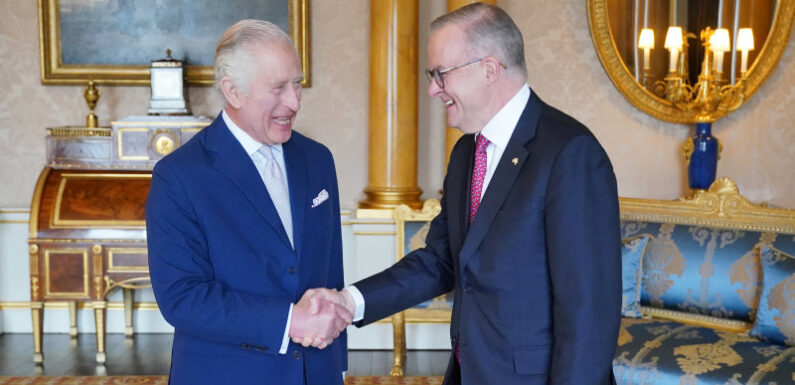
Save articles for later
Add articles to your saved list and come back to them any time.
Leading campaigners for splitting Australia from the monarchy remain hopeful of the nation becoming a republic, but some fear the cause may be lost for a generation.
Prime Minister Anthony Albanese has previously flagged the possibility of a referendum on a republic in the second term of his government should it be re-elected.
King Charles III with Prime Minister Anthony Albanese at Buckingham Palace in May.Credit: Getty
But in May he said his priority was on the Indigenous Voice referendum and stressed he did not want to be a “prime minister who presides over just constitutional debates”.
Division within the Australian Republic Movement emerged earlier this year over whether the outfit should campaign for the Voice. After agonising over the decision, it appointed No campaigner Warren Mundine to a broader Voice advisory body and chose not to back the Indigenous referendum, partly to avoid alienating conservative republicans.
A referendum on Australia becoming a republic was held in 1999, when Australians voted to stick with the monarchy with a national No vote of 54.9 per cent. The question proposed replacing the Queen and Governor-General with a President appointed by a two-thirds majority of the members of the Commonwealth parliament. As with the Voice referendum, no states had a majority in favour of the constitutional change.
Multiple senior republic figures, who requested anonymity to speak frankly, said it was likely the push for independence was doomed for another “generation” after Saturday’s vote. “That is the clear takeout from this. It is tragic,” one said.
But Australian Republic Movement chief executive Isaac Jeffrey claimed he did not believe the Voice loss would have any influence on Labor’s appetite to pursue another referendum.
“It would take a few years for us to work through what the model looks like and for people to be ready to have a vote,” he said. “If it takes a bit longer [than being held in Labor’s second term], that is alright.”
Australian Monarchist League chair Eric Abetz, a former Liberal senator, said the Voice referendum proved Australians would only change the constitution when the proposed change was viewed as crystal clear and compelling, which he said the republic change was not.
Labor’s assistant minister for the republic Matt Thistlethwaite is not taking interviews about the republic as the government lets the dust settle following Saturday’s referendum defeat.
One Labor MP said: “It’s pretty clear this now won’t be happening next term. Who knows when the time is right for it to be put back on the agenda. Not soon.”
Greg Barnes in 1999, when he was campaign director for the Yes vote in the republic referendum.Credit: Peter Rae
Barrister Greg Barnes, one of the leaders of the 1999 campaign, rejected the suggestion the cause was doomed for a long period.
He said the monarchy was in inexorable decline, as evidenced by King Charles’ relative unpopularity compared with Queen Elizabeth II, the growing number of nations becoming a republic, and the incoming New Zealand prime minister’s support for his nation cutting ties with Great Britain.
“I don’t accept this view it’s gone for another generation, but it may have to be a slower process,” Barnes said.
“What [the Voice referendum] demonstrated, as we saw in 1999, is the difficulty of constitutional reform and that the capacity for people to wreck progress is not in any way diminished. If anything, it’s enhanced,” he said.
ARM vice-chair Meredith Doig said it would be naive to think Labor would not consider the Voice result when thinking about its plans for a republic. “But that doesn’t mean they don’t take up challenging topics,” she said.
A Guardian Australia article published last year by ARM national committee candidates Thom Woodroofe and Tully Fletcher said: “If the voice referendum fails, republicans can forget about their own referendum for another generation – it just wouldn’t make political sense for an Albanese government to roll the referendum dice again for one that looks even less certain of victory”.
Another senior republican source said fundraising for the cause would become more difficult for the foreseeable future.
Cut through the noise of federal politics with news, views and expert analysis from Jacqueline Maley. Subscribers can sign up to our weekly Inside Politics newsletter here.
Most Viewed in Politics
From our partners
Source: Read Full Article

